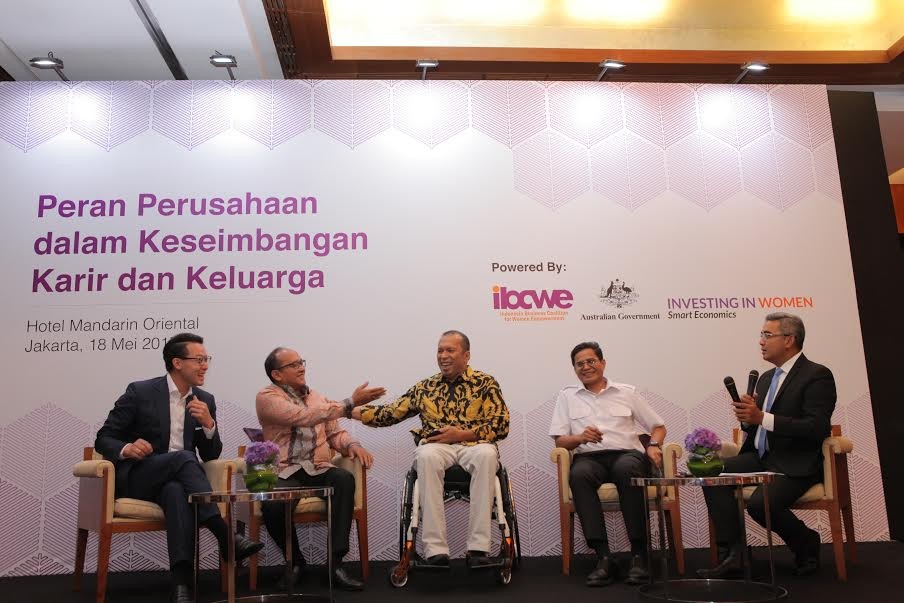Popular Reads
Top Results
Can't find what you're looking for?
View all search resultsPopular Reads
Top Results
Can't find what you're looking for?
View all search resultsIndonesian CEOs seek balanced life for family, careers
Change text size
Gift Premium Articles
to Anyone
 Male business: CEO of General Electric Indonesia Handry Satriago (center) shares a laugh with Rosan P. Roeslani, chair of the Indonesian Chamber of Commerce (Kadin), with Lippo Group Director John Riady (far left), Garuda Indonesia CEO Pahala Mansury (second right) and moderator Farchan. They were panelists on Thursday's commemoration of International Family Day, which falls on May 15, held by the Indonesia Business Coalition for Women Empowerment. (Courtesy of IBCWE/File)
Male business: CEO of General Electric Indonesia Handry Satriago (center) shares a laugh with Rosan P. Roeslani, chair of the Indonesian Chamber of Commerce (Kadin), with Lippo Group Director John Riady (far left), Garuda Indonesia CEO Pahala Mansury (second right) and moderator Farchan. They were panelists on Thursday's commemoration of International Family Day, which falls on May 15, held by the Indonesia Business Coalition for Women Empowerment. (Courtesy of IBCWE/File)
It was a strange sight – an all-male panel of CEOs talking about family and equality at the workplace.
But as CEO Shinta W. Kamdani said, men should also be involved in taking care of children and the household, therefore “conversations on family and gender equality […] must also be a man’s business.”
The CEOs are “male champions,” which could be a benchmark for gender equality in the workplace, said Shinta, who leads the Indonesian Business Coalition for Women Empowerment (IBCWE), which held the talks recently in commemoration of International Family Day on May 15.
The corporate chiefs stepped up to the challenge of not only ensuring equality at the workplace, but also of bringing about balance between careers and family life.
New Garuda Indonesia CEO Pahala Mansury, formerly of Bank Mandiri, said he realized he was “returning home at 2 a.m.”
Particularly with the 24/7 nature of the aviation industry, he said, “it’s a real challenge to retain talent” as today’s “Generation Z,” known for less loyalty to the the workplace compared to elders, seek a stimulating environment and a balance of work and life.
Other speakers were Indonesian Chamber of Commerce (Kadin) chairman Rosan Roeslani, Lippo Group Director John Riady and Handry Satriago of General Electric Indonesia.
A few Western countries and South Korea are among those with paternal leave, but generally “men are not encouraged to play a larger domestic role, while women are overwhelmed,” John said.
Companies, he said, “could encourage fathers at certain levels to take kids to school, for instance.” He said he managed to do so a few times, “and I was the only male” among parents dropping off their children at school.
Seeking work for wives in areas where their husbands were assigned to is one way to help families stay together, John said.
The CEOs said they had found that a better mix of men and women made better teamwork and creativity.
However they acknowledged women tended to leave when they had families, and, as Australian Ambassador to Indonesia Paul Grigson said, “women tend not to apply for leadership positions.”
Australia’s program called Investing in Women, which builds on the country's existing partnership with Indonesia, focuses on improving gender equality in businesses.
Garuda CEO Pahala said from over 1,300 pilots and co-pilots, “we only have one [female] captain”. He added Garuda could also try to attract more females into its engineering department apart from the female-dominated flight attendants.
General Electric’s Handry said worldwide GE has recently started its program called STEM (science, technology, engineering and mathematics) to gain 20,000 women by 2020 since it realized it had too few women in technology-related sectors. The policy makes business sense, Handry said, quoting findings that closing the gender gap could increase national and global gross domestic product.
IBCWE executive director Dini Widiastuti said women “often have to choose between family and careers when policies at their workplace are not conducive.”
As a result, the Asia Development Bank shows that while 57 percent of Indonesia’s university graduates are women, only 47 percent enter the labor force; of which 20 percent reach middle management positions and just five percent reach the boardroom.
“We have to ensure working women and parents are better facilitated to balance career, working life and family,” Dini said.
The IBCWE currently comprises PT Gajah Tunggal, PT Bank Tabungan Pensiunan Nastional, PT Pan Brothers, PT Accenture, PT Adis Dimension Sportwear, PT Mitra Adi Perkasa, PT Unilever Indonesia and Shinta’s Sintesa Group, which business includes renewable energy.









